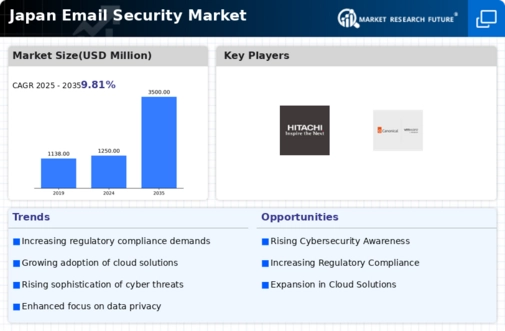Rising Cybersecurity Threats
The Japan email security market is experiencing a surge in demand due to the increasing frequency and sophistication of cyber threats. Reports indicate that Japan has seen a notable rise in phishing attacks and ransomware incidents, prompting organizations to prioritize email security solutions. In 2025, the number of reported cyber incidents in Japan reached over 20,000, highlighting the urgent need for robust email security measures. As businesses recognize the potential financial and reputational damage caused by data breaches, investments in email security technologies are likely to escalate. This trend suggests that the Japan email security market will continue to grow as companies seek to protect sensitive information and maintain customer trust.
Increased Remote Work Practices
The Japan email security market is witnessing growth due to the rise of remote work practices. As more organizations adopt flexible work arrangements, the reliance on email communication has intensified, creating new vulnerabilities. A survey conducted in late 2025 revealed that 65% of companies in Japan experienced an increase in email-related security incidents since transitioning to remote work. This shift has prompted businesses to enhance their email security protocols, leading to a greater demand for advanced email protection solutions. Consequently, the Japan email security market is likely to expand as organizations seek to safeguard their remote communication channels and protect sensitive data.
Regulatory Compliance Requirements
The Japan email security market is significantly influenced by stringent regulatory compliance requirements. The Personal Information Protection Act (PIPA) mandates that organizations implement adequate security measures to protect personal data. Non-compliance can result in severe penalties, which has led many companies to invest in email security solutions to ensure adherence to these regulations. In 2025, approximately 70% of businesses in Japan reported that compliance with data protection laws was a primary driver for their email security investments. This regulatory landscape is expected to further propel the growth of the Japan email security market as organizations strive to meet legal obligations and avoid potential fines.
Growing Awareness of Cybersecurity Risks
The Japan email security market is benefiting from a growing awareness of cybersecurity risks among businesses and consumers. Educational initiatives and high-profile data breaches have heightened the understanding of the importance of email security. In 2025, around 80% of Japanese companies reported that they had increased their cybersecurity budgets, with a significant portion allocated to email security solutions. This trend indicates a shift in mindset, where organizations are proactively investing in protective measures rather than reacting to incidents. As awareness continues to rise, the Japan email security market is expected to thrive, driven by the demand for comprehensive email security strategies.
Technological Advancements in Security Solutions
The Japan email security market is experiencing rapid growth due to technological advancements in security solutions. Innovations such as artificial intelligence and machine learning are being integrated into email security products, enhancing their effectiveness in detecting and mitigating threats. In 2025, the adoption of AI-driven email security solutions in Japan increased by 40%, as organizations sought to leverage these technologies for improved threat detection and response. This trend suggests that the Japan email security market will continue to evolve, with businesses increasingly relying on cutting-edge technologies to protect their email communications and sensitive information.












